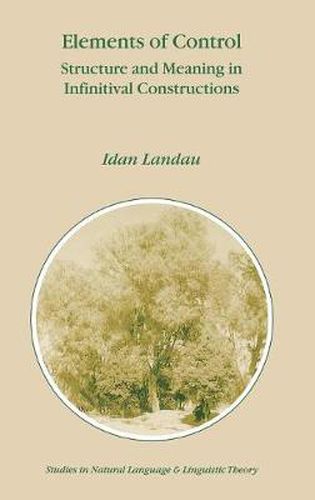Readings Newsletter
Become a Readings Member to make your shopping experience even easier.
Sign in or sign up for free!
You’re not far away from qualifying for FREE standard shipping within Australia
You’ve qualified for FREE standard shipping within Australia
The cart is loading…






This title is printed to order. This book may have been self-published. If so, we cannot guarantee the quality of the content. In the main most books will have gone through the editing process however some may not. We therefore suggest that you be aware of this before ordering this book. If in doubt check either the author or publisher’s details as we are unable to accept any returns unless they are faulty. Please contact us if you have any questions.
This work offers an outlook on the derivation and interpretation of control constructions. From data and observations, it argues that obligatory control comes in two varieties: exhaustive or partial control, the latter obtaining when PRO properly includes the controller. This distinction, arguably universal, is tightly linked to the tense specification of the infinitive. Non-obligatory control, on the other hand, is structurally conditioned, obtaining only in VP-external infinitives. A detailed investigation of how control interacts with super-equi constructions and psychological predicates sheds new light on issues such as extraposition, argument structure, and semantic selection. This book clears up some common misconceptions about the nature of control, as well as sharpening the empirical challenges that face any comprehensive theory in this domain. Regardless of theoretical framework, scholars of syntax and semantics interested in these topics, should find this book a major contribution to the field.
$9.00 standard shipping within Australia
FREE standard shipping within Australia for orders over $100.00
Express & International shipping calculated at checkout
This title is printed to order. This book may have been self-published. If so, we cannot guarantee the quality of the content. In the main most books will have gone through the editing process however some may not. We therefore suggest that you be aware of this before ordering this book. If in doubt check either the author or publisher’s details as we are unable to accept any returns unless they are faulty. Please contact us if you have any questions.
This work offers an outlook on the derivation and interpretation of control constructions. From data and observations, it argues that obligatory control comes in two varieties: exhaustive or partial control, the latter obtaining when PRO properly includes the controller. This distinction, arguably universal, is tightly linked to the tense specification of the infinitive. Non-obligatory control, on the other hand, is structurally conditioned, obtaining only in VP-external infinitives. A detailed investigation of how control interacts with super-equi constructions and psychological predicates sheds new light on issues such as extraposition, argument structure, and semantic selection. This book clears up some common misconceptions about the nature of control, as well as sharpening the empirical challenges that face any comprehensive theory in this domain. Regardless of theoretical framework, scholars of syntax and semantics interested in these topics, should find this book a major contribution to the field.